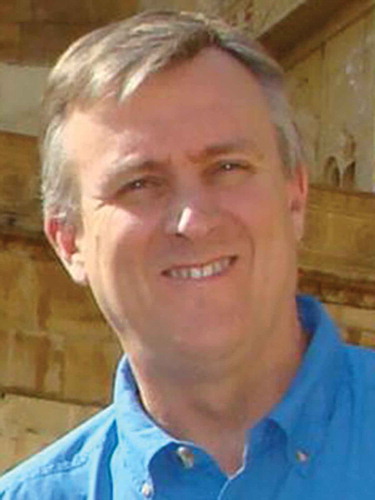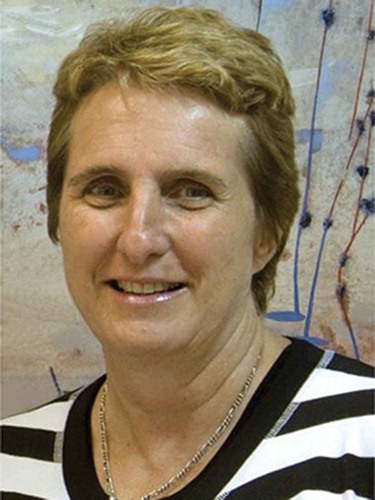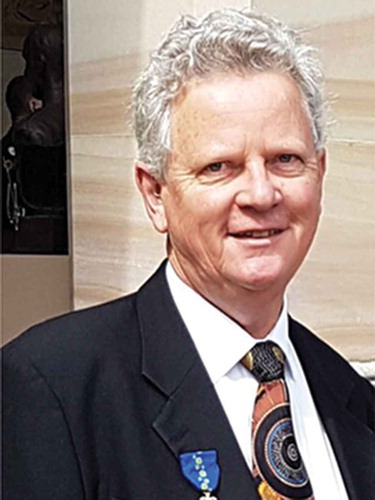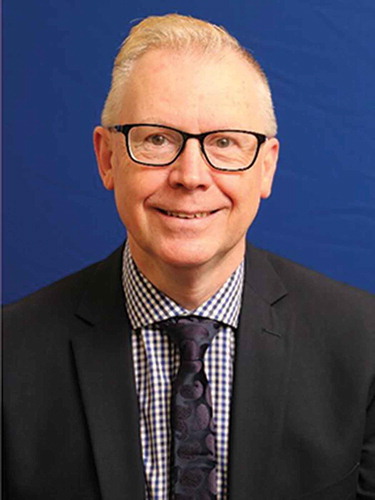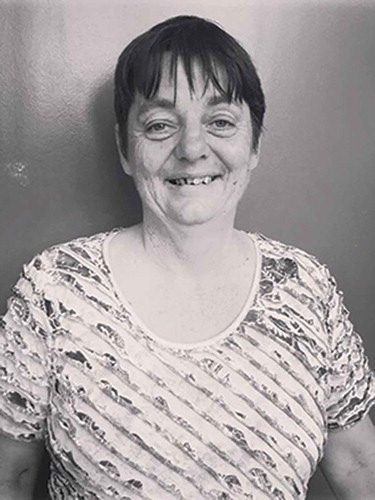In this issue, we celebrate people from the library and information world who received national honours on Australia Day and the Queen’s Birthday in 2018. All too often, work in the information professions goes unrecognised beyond the appreciation of the communities for whom services, resources, places and spaces are provided, so it is wonderful when achievements are recognised more broadly. We were fortunate to be able to contact some of them and present here some of their biographies as an inspiration to us all. We also recognise Leah Mann, former CEO of the State Library of Victoria who was awarded AM on Australia Day. Each of the people on this list made significant contributions, in quite different ways, to our libraries and information organisations, to our profession and to Australia, and we congratulate them on their awards.
Day Honours
Mr Kevin James BRADLEY, PSM
Mr Kevin James BRADLEY received the Public Service Medal (PSM) Federal for outstanding public service through the digital preservation of audiovisual heritage material. Mr Bradley has been the driving force in the development of innovative approaches to preserving and providing Australians with access to the National Library of Australia’s significant collection of unique oral history and folklore recordings. He has developed a 15-year plan to digitally preserve the National Library’s audio collection, recognising that the imminent obsolescence of playback equipment risked the future loss of unique heritage. No other cultural institution is as far advanced in digital preservation of its audio collections, and the National Library’s outcomes have been achieved entirely within existing resources. He is a world expert in the preservation and digitisation of audiovisual archival heritage material and was President and long-standing Executive member of the International Association of Sound and Audiovisual Archives (IASA) and UNESCO’s Memory of the World Subcommittee on Technology and Information for All Programme Technical Committee. As Vice-Chair of the IASA Technical Committee, and with their input and support, Mr Bradley edited and helped write much of the content of the ‘IASA TC 04 Guidelines for the production and preservation of digital audio objects’ https://www.iasa-web.org/audio-preservation-tc04, which has become an international standard.Since doing this work, which he undertook while Curator of Oral History and Folklore, Mr Bradley has been the Senior Curator for Research Collection and Unpublished Materials (Pictures and Manuscripts), undertaken short stints in a variety of executive positions and is now Assistant Director General at the National Library of Australia, responsible for Australian Collections and Reader Services. He remains deeply committed to the work of building, preserving and providing physical and digital access to all the Library’s collections, in particular the special collections. The long-in-preparation companion to the Audio Guidelines, ‘IASA-TC 06 Guidelines for the Preservation of Video Recordings’ has been released for discussion https://www.iasa-web.org/tc06/guidelines-preservation-video-recordings, which was co-edited by Carl Fleischhauer and Kevin Bradley.
Ms Margaret Joan ALLEN, PSM
Former ALIA President (2011–2012) Ms Margaret Joan ALLEN was awarded the Public Service Medal (PSM) Western Australia ‘for outstanding public service to the libraries sector in Western Australia’, in the 2018 Australia Day Honours List. Margaret is the CEO of the State Library of WA and State Librarian and has been an active Member of ALIA and IFLA for many years, supporting both organisations at the highest levels. A strong focus of Margaret’s working life is evidenced through her commitment to reading and literacy, particularly through the State Library of Western Australia’s Better Beginnings program, which began in 2004 and quickly became a best practice model for many baby/book programs across Australia.In 2014, the Australian Library and Information Association (ALIA) awarded an ALIA Fellowship to Margaret. This Fellowship is given to an ALIA member who has reached an exceptionally high standard of proficiency through their work in libraries and has made a distinguished contribution to the theory or practice of library and information science. Under Margaret’s direction, the Storylines Project has directly contributed to the preservation of Indigenous heritage. Through Storylines, the State Library works in partnership with Aboriginal people to ‘build and maintain an online database of digitised heritage material from the Library’s collections relating to Aboriginal history’.
Margaret has worked extensively in and for libraries for many years, including 15 years in the private sector with a library management system vendor. Her diverse employment history also includes roles in both public and special libraries as well as serving as Associate Director of the State Library of South Australia. She has been and continues to be a member of an extensive list of library boards and committees, including associate membership of IFLA International Leadership program and a member of the INELI-Oceania Steering Committee.
Margaret’s well-deserved Australia Day award honours her long-standing commitment and service to both the Western Australian, National and International library sector.
Queen’s Birthday Honours
Dr Alex BYRNE, AM
Dr Alex Byrne was appointed a Member of the Order of Australia (AM) in the 2018 Queen’s Birthday Honours for significant service to library and information management through initiatives to develop access to global and Indigenous resources. Appropriately, the citation highlighted two of Alex’s major contributors to the profession, international and Indigenous initiatives, both of which extended well beyond his day-to-day duties and responsibilities. His other honours include the HCL Anderson Award, Chevalier de l’ordre des Arts et des lettres and fellowships of ALIA, IFLA and UTS.Although he originally trained as an electrical engineer, Alex did not work at that field, choosing instead to follow his wife’s suggestion and enter the library profession through a Graduate Diploma at the then Canberra CAE. He was in tune with the analytical and engaged approach to librarianship championed by John Balnaves, Peter Biskup and colleagues which emphasised the context and consequences of practice beyond its mechanics. Alex’s first professional position was at James Cook University where he worked with Helen Penridge to introduce the novel searching of online bibliographic databases and subsequently the creation of specialist research databases, was responsible for a range of client services and assisted the University Librarian, Chris Hunt, with organisational change when the University merged with the Townsville CAE. He then moved back to Canberra with a young family and worked with Lynn Hard as Deputy Librarian to establish the Australian Defence Force Academy Library, which was very innovative in its service models and use of technology. During those years, he also completed a Graduate Diploma in Advanced Librarianship and a Master of Arts by research, focusing on online searchers and supervised by Nancy Lane.
Later, Alex was appointed as the foundation University Librarian at the new Northern Territory (now Charles Darwin) University in Darwin. Not content with building university-level collections, services, staff and, later, buildings, Alex engaged with colleagues in Southeast Asia, developed databases, and – signally – issues relating to Indigenous Australians and libraries. The last resulted in the 1995 publication of the Aboriginal and Torres Strait Islander Protocols for Libraries, Archives and Information Services, now known as the ATSILIRN Protocols which is influential both nationally and internationally. Locally, much improved involvement with Indigenous students and staff resulted in the NTU Library being recognised as one of only two ‘safe spaces’ on the campus. Alex’s roles broadened when he was appointed Director of Information Services and then Pro Vice Chancellor, responsible for teaching and learning, remote area education, information technology and other services.
In 2000, Alex joined UTS as University Librarian and later Vice President (Alumni & Development) and Pro Vice Chancellor (Teaching & Learning). Innovations included the establishment in 2004 of one of the first open access scholarly presses, UTSePress and also the Aboriginal and Torres Strait Islander Data Archive. After 11 years, he left to become the CEO at the State Library of NSW where he again set about a major program of organisational development, technological renewal, building refurbishment and expansion, innovation, fundraising and strengthening governance and planning. Developments included the establishment of the Library’s first Indigenous services branch, a 10-year program to digitise the heritage collections and a building master plan to refurbish public and staff areas and provide sufficient environmentally suitable collection storage and double gallery space, which has now been realised.
Throughout his professional career, Alex has been active in professional bodies. He led various sections of ALIA, was President of CAUL and led many of its activities and chaired NSLA at the time of its work with Museums Australia to establish the GLAM Alliance. His peak professional contribution was to be elected President of IFLA, 2005–2007, following his success as the first chair of the Freedom of Access to Information & Freedom of Expression (FAIFE) program, 1997–2003. Among his presidential initiatives was the foundation of the Indigenous Matters Section which provides a platform and voice for Indigenous colleagues and concerns internationally.
The author of some 400 articles, addresses and reports, Alex has grounded his practice in research employing a wide variety of strategies and methodologies. Some has been funded by the ARC or other agencies, some has been ‘in house’ and some pursuing personal interests. His PhD was awarded by the University of Sydney in 2005 for action research into the genesis and consequences of IFLA’s FAIFE initiative.
In his own words, Alex writes that ‘I was fortunate to choose a great and important profession and to enjoy wonderful opportunities, talented and dedicated colleagues and strong family support’.
Mr Robert KNIGHT, OAM
Robert Knight was awarded a Medal of The Order of Australia (OAM) in the 2018 Queen’s Birthday Honours for service to the library and information sciences sector, particularly in the Riverina.Robert joined the library and information sector after completing a BA Library & Information Science at the Riverina College of Advanced Education (now Charles Sturt University) in 1979.
He gained employment at the Riverina Community Library Service (now Riverina Regional Library – RRL) in 1980 in the role of Reference & Local History Librarian. He held a number of positions at RRL before being appointed to the role of Regional Library Manager in 1993. Robert has always acknowledged that this was (and continues to be) his dream job, which he still holds today.
Robert has made a significant contribution to the Australian public library sector throughout his career spanning some 38 years. His participation has been evident at the local, regional, state and national levels and has impacted many aspects of library practice. At the local level, Robert has developed the RRL to be broadly recognised as an exemplar of regional collaboration in NSW. RRL is the largest regional library in NSW serving a large regional library population of 138,000 in a geographic area of 48,000 square km through a network of 19 branch libraries (including a mobile library that visits 28 communities each fortnight).
Regionally, Robert has supported the development of libraries in the NSW Public Libraries Association (NSWPLA) South-West Zone and has held the role of South-West Zone secretary for many years. In 2011, he led an initiative to establish the South-West Zone Digital Library – a project providing the constituents of 23 council areas with access to a wide range of eResources from their homes. The consortium approach has enabled the 44 libraries across the Zone to provide borrowers with equal access to a wide range of eResources which would have otherwise been individually unaffordable to many libraries.
At the state level, Robert’s leadership has been demonstrated through his appointment to the Library Council of NSW as the NSW Local Government representative from 2001 to 2010, his lengthy service as a member of the NSW Public Libraries Consultative Committee (including 9 years as Chairperson) and membership of the NSWPLA Executive for more years than even he can remember.
Nationally, Robert has served on various associations and committees and is currently President Elect of the Australian Library and Information Association (ALIA), transitioning to President in 2019. He is also the inaugural Chairperson of the Australasian Mobile Library & Outreach Services Network (AMLOSN).
Robert has presented numerous papers at library and related sector conferences across Australia. He was awarded the NSW Local Government and Shires Association Albert Mainerd Scholarship in 2000 for which he undertook a research project to study the effects of declining rural populations on library service provision in the US, Canada and England, resulting in his publication ‘Last one out turn off the lights: the influence of geographic, demographic and economic factors on the provision of library services in rural and remote communities’.
Robert has been recognised by his peers on two previous occasions, through the bestowal of a Life Membership Award by the NSW Public Libraries Association in 2012 and the awarding of a Library Council of NSW Honour in 2014 – the inaugural year of the Library Council Honours program.
Lucy May KINSLEY, PSM
Lucy Kinsley was awarded the Public Service Medal for ‘outstanding public service to community library services in New South Wales’. She began her library career in Casino Public Library as a library assistant in 1971 and then at Lismore Library in March 1974. Her first day at work in Lismore involved sweeping flood-damaged books out through the loading bay doors. She graduated from Charles Sturt University in Wagga Wagga in Library and Information Science after studying externally while working. After having a break to have two children and travel, Lucy returned to Lismore Library in 1978 and in 1987 became Area Librarian for Lismore City Council. Lucy has worked to ensure that the ‘community hub’ which is the Library has adapted to major global, national and local changes, staying relevant and accessible.Lucy is a leader with courage to innovate and build new programs and services for a highly regarded and much appreciated community facility, developing programs and events responding directly to the needs of the Lismore community and the Northern Rivers region.
The Lismore Libraries (including Goonellabah and the Mobile Library stops) in have continued to develop under Lucy’s guidance, offering an array of services to meet the needs of all ages from the new born to the frail aged. Examples of services include Babybounce, Storytime, Indigenous Storytime, Lismore Let’s Read, Teen nights, HSC Help, Book Clubs including the Reconciliation Book Club, Tech Savvy for Seniors, Law talks, Multicultural events and services and Home Library Services.
Under her leadership, Lismore City Library launched the Living Library in 2006, now the Human Library. Lismore Library was the first Australian library to introduce the Living Library, the aim of which is to break down barriers and create a more tolerant society. The Human Library continues to flourish in 2018 with regular events at the Library and visits to schools and nursing homes in the area. Lucy gives her time freely to assist and advise libraries both nationally and internationally who wish to introduce their own Living Library program. This program reflects Lucy’s unwavering 40-year vision for the Library to be an inclusive and engaging space for the Lismore community and beyond.
In 2007, Lismore City Council successfully applied for a $150,000 ‘Living in Harmony’ grant to enable a national roll out of the Living Library initiative. This initiative was supported by the Australian Library and Information Association (ALIA). The Living Library went on to win the NSW State Library ‘Most Creative Project’ in the Marketing Award for NSW Public Libraries in 2007, and in 2008, Lucy was the recipient of the Jean Arnot Memorial Fellowship for her essay about the Living Library project. In 2011, Lismore City Library won a LIAC Centre of Excellence Award presented by the State Library of NSW for the Lismore City Library Law Talks.
One of Lucy’s greatest strengths is her support of young people in the community. Lucy developed a Junior Shelvers program in the Lismore Library, providing students the opportunity to gain valuable work experience. Through her guidance and support, many of these students have gone on to find permanent work in the library or other local organisations and businesses. A number have also gone on to complete tertiary studies, and four of her staff are currently working part time whilst studying.
Lucy also supports high school and library students seeking work experience opportunities. In addition, Lucy is an active member of the community, supporting various organisations and groups such as the Lismore Lantern Parade, Friends of the Koala, Redinc.org, Richmond River Historical Society and local members of the refugee community.
In May 2018, Lucy celebrated her 40-year anniversary as a librarian with Lismore City Council and Richmond Tweed Regional Library. Lucy is a valued contributor to her community.

